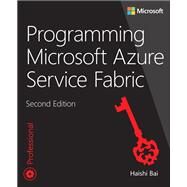Programming Microsoft Azure Service Fabric
, by Bai, Haishi- ISBN: 9781509307098 | 1509307095
- Cover: Paperback
- Copyright: 6/4/2018
Build, operate, and orchestrate scalable microservices applications in the cloud
This book combines a comprehensive guide to success with Microsoft Azure Service Fabric and a practical catalog of design patterns and best practices for microservices design, implementation, and operation. Haishi Bai brings together all the information you’ll need to deliver scalable and reliable distributed microservices applications on Service Fabric. He thoroughly covers the crucial DevOps aspects of utilizing Service Fabric, reviews its interactions with key cloud-based services, and introduces essential service integration mechanisms such as messaging systems and reactive systems.
Leading Microsoft Azure expert Haishi Bai shows how to:
- Set up your Service Fabric development environment
- Program and deploy Service Fabric applications to a local or a cloud-based cluster
- Compare and use stateful services, stateless services, and the actor model
- Design Service Fabric applications to maximize availability, reliability, and scalability
- Improve management efficiency via scripting
- Configure network security and other advanced cluster settings
- Collect diagnostic data, and use Azure Operational Management Suite to interpret it
- Integrate microservices components developed in parallel
- Use containers to mobilize applications for failover, replication, scaling, and load balancing
- Streamline containerization with Docker in Linux and Windows environments
- Orchestrate containers to schedule workloads and maintain services at desired states
- Implement proven design patterns for common cloud application workloads
- Balance throughput, latency, scalability, and cost







